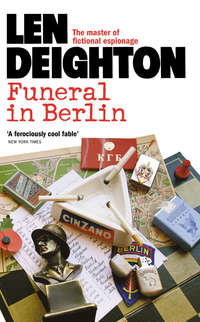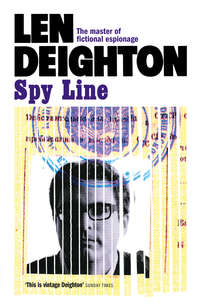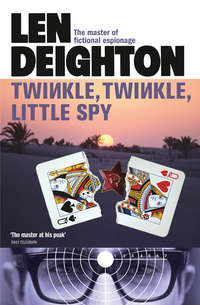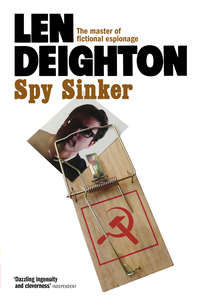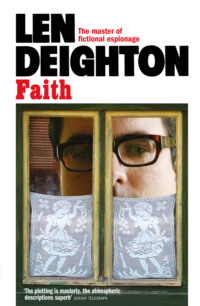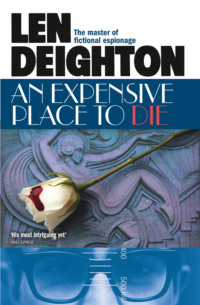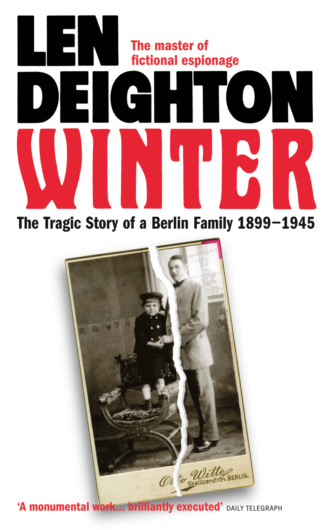
Полная версия
Winter: A Berlin Family, 1899–1945

Cover designer’s note
In attempting to come up with a concept for the cover design for Winter, Len Deighton’s saga of a Berlin family set in the first half of the twentieth century, I sought a striking image that would express the outcome of the Winter family’s story. I recalled a photograph in my wife Isolde’s family album of her father as a child dressed in a sailor suit standing beside his father. This image seemed to fit the time and place precisely. By tearing the photograph apart it implied the outcome of their relationship; and in a metaphorical sense it would also suggest what lay ahead for the city, and indeed the entire country. Sometimes the simplest of images are the most effective.
The related ephemera on the back cover includes a number of objects of the period taken from my personal collection, including a gramophone needle tin (which was featured in my book Phonographics) that has the Berlin dealer’s name on the lid; its contents still containing a few needles, a small button and an unused Adolf Hitler postage stamp. Also appearing is a china Zeppelin ornament, several early postcards including one of Graf Zeppelin and one of the Brandenburg gate, plus a German bank note. The group photograph is of my wife’s mother’s family.
The Nazi era stamp on the book’s spine commemorates Graf Zeppelin and his airship LZ2, one of many that did not survive to make a second flight. Fortunately, when she was driven to the ground in 1906 by winds too strong for her engines, no one was hurt. But this was rarely the case.
Arnold Schwartzman OBE RDI
Len Deighton
Winter
The Tragic Story of a Berlin Family 1899–1945

Copyright
This novel is entirely a work of fiction. The names, characters and incidents portrayed in it are the work of the author’s imagination. Any resemblance to actual persons, living or dead, events or localities is entirely coincidental.
Published by HarperCollinsPublishers Ltd 1 London Bridge Street London SE1 9GF
www.harpercollins.co.uk
First published in Great Britain by Hutchinson Ltd 1987
WINTER. Copyright © Len Deighton 1987
Len Deighton asserts the moral right to be identified as the author of this work
Introduction copyright © Pluriform Publishing Company BV 2010
Cover designer’s note © Arnold Schwartzman 2010
A catalogue record for this book is available from the British Library
All rights reserved under International and Pan-American Copyright Conventions. By payment of the required fees, you have been granted the nonexclusive, nontransferable right to access and read the text of this ebook on-screen. No part of this text may be reproduced, transmitted, downloaded, decompiled, reverse-engineered, or stored in or introduced into any information storage and retrieval system, in any form or by any means, whether electronic or mechanical, now known or hereinafter invented, without the express written permission of HarperCollins ebooks
HarperCollinsPublishers has made every reasonable effort to ensure that any picture content or written conten in this ebook has been included or removed in accordance with the contractual and technological constraints in operation at the time of publication
Source ISBN: 9780586068953
Ebook Edition © JUNE 2010 ISBN: 9780007387212
Version: 2017-08-18
Contents
Cover designer’s note
Title Page
Copyright
Introduction
Prologue
1899
‘A whole new century’
1900
A plot of land on the Obersalzberg
1906
‘The sort of thing they’re told at school’
1908
‘Conqueror of the air – hurrah!’
1910
The end of Valhalla
1914
War with Russia
1916
‘What kind of dopes are they to keep coming that way?’
1917
‘Not so loud, voices carry in the night’
1918
‘The war is won, isn’t it?’
1922
‘Berlin is so far away and I miss you so much’
1924
‘Who are those dreadful men?’
1925
‘You don’t have to be a mathematician’
1927
‘That’s all they ask in return’
1929
‘There is nothing safer than a zeppelin’
1930
A family Christmas
1932
‘Was that more shouting in the street?’
1933
‘We think something is definitely brewing over there’
1934
‘Gesundheit!’
1936
‘Rinse and spit out’
1937
‘You know what these old cops are like’
1938
‘Being innocent is no defence’
1939
‘Moscow?’ said Pauli
1940
The sound stage
1941
‘It was on the radio’
1942
‘I knew you’d wait’
1943
‘Happy and victorious’
1944
‘We’re all serious’
1945
‘It’s a labour of love’
Keep Reading
About the Author
Also by the Author
About the Publisher
Introduction
This is how it started. It was Friday afternoon – exactly 2.20 pm – and the snow was falling. The flakes that hit the car’s windscreen were not the soft, watery sort that slide downwards and fade away like old soldiers. These were solid bullets of ice, perfectly formed and determined to stay put. These were German snowflakes. Our elderly Volvo was on the road heading west from Munich, with the cold waters of the Ammersee close at hand and my sons on the back seat politely starving to death. My wife was at the wheel. ‘The next place we see; we stop,’ I said. ‘It’s getting late. I don’t care if it’s just a currywurst van parked on the roadside.’
The ‘next place’ was the Gasthof Kramerhof. It was a typical Bavarian inn, with a large restaurant that attracted locals and a few well-kept rooms for travellers. It was sited well back from the road and had an extensive parking area, which is often a measure of an inn’s popularity. Now lunchtime had ended and there were no cars there. The loops of tyre tracks that marked their departure were now disappearing under the continuing snowfall. But in such a Gasthof all travellers are welcome and mealtime lasts all day. Soon we were relishing a Bavarian meal: kraftbrühe – clear soup – followed by pork cutlets in a sour cream sauce with spätzle on the same plate. Had I been better informed about German food I might have guessed that the owners were Schwabs, for these were the long square-sided ‘pasta’ that is a delight of Schwabian cooking.
Outside, the snow was conquering the world. The sky was steely grey and descending upon the treetops. Stacked on the Volvo’s oversized roof rack, our bags and boxes now looked like a scale model of the Alps. What else was there to do? We stayed there for the weekend. That’s all it took for the Kramerhof to become our home and we remained there for many months. From the hotel room we moved one floor higher where I set up my portable typewriter in the attic rooms originally furnished for a mother-in-law. It was cramped under the steeply sloping roof and I banged my head a lot but this was the sort of Germany I wanted to write about. All the events of the neighborhood were celebrated there under our noses, from weddings – complete with amateur brass band – to hunting-dinners from which the smell of wine-rich venison drifted upwards to reach us in the early hours of morning.
My wife’s fluent German impressed the lady in the village post office and we soon knew everything about everyone. There was enough social life to furnish a dozen lurid novels. Retired military men abounded. I met a relative of General Gehlen, one of the very few spies who influenced history. The Kramerhof food was wonderful, the customers were entertaining and the owners became friends. They allowed us into the well-ordered kitchen where we learned how to make Schwabian spätzle and much more.
Winter was a biography of the Germany I had come to know over the years. We had lived in Vienna and in an Austrian village near Salzburg, which was now not all that far away, and my sons spoke a strongly accented German. For many Germans, and many historians too, Germany and Austria do not have a separate existence. AJP Taylor, who taught me so much about German history, persuaded me to consider both in unison and for that reason the story of Winter begins in Vienna. One of our neighbours in Riederau village had a son writing for a newspaper in Vienna. At my request, he rummaged through the archives to find out what the weather was like in Vienna on ‘the final evening of the 1800s’. Now I had no excuse for delay.
I knew what I wanted to say; I had been planning it for years. My hesitation had come from the problems of continuity. In the beneficial absence of formal instruction in the skills of writing fiction, I found it natural to write sequences in ‘real time’. In my book conversations and physical actions as depicted were apt to take about the same time as the reader took in reading about them. Of course there were expansions and compressions so that only the highlights of dinner party chit-chat were necessary; split-second reactions were expanded to encompass thought and reactions. But now I was going to relate the events of fifty years; I faced many problems I never even guessed about. Somerset Maugham, a writer I much admired, would often write in the first person of a man who observed the events of which he wrote. Maugham’s voice was apt to bridge his narrative with ‘…it was three years before I was to see either of them again, and it was in very different circumstances’. As a reader I rather delighted in this voyeur writer but I didn’t feel confident enough to use such leaps in time. And the frantic pace of German history would not survive a leisurely survey.
I sought advice from my literary agents Jonathan and Ann Clowes – the most widely read friends I have – and examined several family saga novels, old; and new. There was a lot to learn. More than once I decided to abandon my project but while I was sorting and sifting my research notes the solution became evident. I would eliminate connective material. My chapters would be brief human interactions, like flashes of lightning illuminating long nights of darkness. This format would require careful selection of material so that each chapter provided a vital link in the story. And yet Winter must not be a history book; it had to be an interesting and emotive story of a family living through Europe’s nightmare past.
I returned to Vienna. Vienna is a town different to any other that I know. The small central area is defined by the Ringstrasse around which, according to his son, the amazing Sigmund Freud ‘marched at a terrific speed almost every day’. Vienna is not so much a town as a spectacle: if you don’t want to visit Sankt Marxer Friedhof – where Mozart’s corpse was tossed into a common grave – you can chew on the famous chocolates that bear his name. If you don’t like the music of Mahler, what about Franz Lehar? If Klimt is too opulent, what about Schiele? If you don’t like the Hotel Sacher; savour your Sachertorte in Demels. If you don’t fancy Graham Greene’s sewers; seek Harry Lime on the big wheel in the Prater. Vienna has something for everyone; from the Wiener Werkstätte to the Wienerwald. Within the Ringstrasse there are more churches, historic buildings, restaurants and shops than anyone needs. But the greatest wonders of the city are its magnificent old cafes. So you can see why, for anyone inflicted with insatiable curiosity, or easily diverted, Vienna is no place to write books.
I chose Munich because that city uniquely links Vienna with Berlin. The inhabitants of these three great German cities view each other with dispassionate superiority. While the mighty Austria-Hungary Empire dominated Europe, Vienna ruled. It was Bismarck, and the Prussian armies that in 1870 marched into Paris, that displaced Vienna and established Berlin’s ascendancy. At the turn of the century, Berlin’s music hall comics got guaranteed laughs from jokes that depicted Bavarians and the Viennese as hopeless country bumpkins. But Hitler changed all that. Hitler was an Austrian and his Nazi Party was born in Munich and when Hitler named that town as the Hauptstadt der Bewegung – ‘capital of the movement’ – all jokes about its citizens were hushed.
I visited all three cities frequently while working on this book but Munich was the place where it all began. My sons attended a local boarding school at Schondorf, and put their Austrian accents on the shelf. With the aid of my wife, I interrogated anyone old enough to provide me with memories of the old days. I was listening to the recollections of a fellow customer in a stationery shop when I spotted a small grey ‘typewriter’ that turned out to be Hewlett Packard’s radical new product. It was the world’s first laptop: a unique, strange and awkward beast by today’s standards – and started writing.
Len Deighton, 2010
Prologue

Nuremberg 1945
Winter entered the prison cell unprepared for the change that the short period of imprisonment had brought to his friend. The prisoner was fifty-two years old and looked at least sixty. His hair had been thinning for years, but suddenly he’d become a bald-headed old man. He was sitting on the iron frame bed, sallow and shrunken. His elbows were resting on his knees and one hand was propped under his unshaven chin. The prison authorities had taken from him his belt, his braces, and his necktie, and the expensive custom-made suit from Berlin’s most famous tailor was now stained and baggy. And yet the dark-underlined eyes were the same, and the pointed cleft chin made him immediately recognizable as a celebrity of the Third Reich, one of Hitler’s most reliable associates.
‘You sent for me, Herr Reichsminister?’
The prisoner looked up. ‘The Reich is kaputt, Germany is kaputt, and I’m not a minister: I’m just a number.’ Winter could think of no way to respond to the bitter old man. He’d become used to seeing him sitting behind the magnificent hand-carved desk in the tapestry-hung room in the ministry, surrounded by aides, secretaries, and assistants. ‘Yes, I sent for you, Winter. Sit down.’
He sat down. So it was all to be formal.
‘I sent for you, Herr Doktor Winter, and I’ll tell you why. They told me you were in prison in London awaiting interrogation. They said that any of us on trial here could choose any German national we wanted for our defence counsel, and that if the one we chose was being held in prison they’d release him to do it. It seemed to me that a man in prison might know what it’s like for me in here.’
Winter wondered if he should offer the ex-Reichsminister a cigarette, but when – still undecided – he produced his precious cigarettes, the military policeman in the corridor shouted through the open door, ‘No smoking, buddy!’
The ex-Reichsminister gave no sign of having heard the prison guard’s voice. He carried on with his explanation. ‘Two, you speak American …speak it fluently. Three, you’re a damned good lawyer, as I know from working with you for many years. Four, and this is the most important, you are an Obersturmbannführer in the SS…’ He saw Winter’s face change and said, ‘Is there something wrong, Winter?’
Winter leaned forward; it was a gesture of confidentiality and commitment. ‘At this very moment, just a few hundred yards from here, there are a hundred or more American lawyers drafting the prosecution’s case for declaring the SS an illegal organization. Such a verdict would mean prison, and perhaps death sentences, for everyone who was ever a member.’
‘Very well,’ said the prisoner testily. He’d always hated what he called ‘unimportant pettifogging details’. ‘But you’re not going to suddenly claim you weren’t a member of the SS, are you?’
For the first time since the message had come that the minister wanted him as junior defence counsel, Winter felt alarmed. He looked round the cell to see if there were microphones. There were bound to be. He remembered this building from the time when he’d been working with the Nuremberg Gestapo. Half the material used in the trial of the disgruntled brownshirts had come from shorthand clerks who had listened to the prisoners over hidden microphones. ‘I can’t answer that,’ said Winter softly.
‘Don’t give me that yes-sir, no-sir, I-don’t-know-sir. I don’t want some woolly-minded, fainthearted, Jew-loving liberal trying to get my case thrown out of court on some obscure technicality. I sent for you because you got me into all this. I remembered your hard work for the party. I remembered the good times we had long before we dreamed of coming to power. I remembered the way your father lent me money back when no one else would even let me into their office. Pull yourself together, Winter. Either put your guts into the effort for my defence or get out of here!’
Winter admired his old friend’s courage. Appearances could be deceptive: he wasn’t the broken-spirited shell that Winter had thought; he was still the same ruthless old bastard that he had worked for. He remembered that first political meeting in the Potsdamer Platz in the 1920s and the speech he’d given: ‘Beneath the ashes fires still rage.’ It had been a recurring theme in his speeches right up until 1945.
‘We’ll fight them,’ said Winter. ‘We’ll grab those judges by the ankles and shake them until their loose change falls to the floor.’
‘That’s right,’ he said. It was another one of his pet expressions. ‘That’s right.’ He almost smiled.
‘Time’s up, buddy!’
Winter looked at his watch. There was another two minutes to go. The Americans were like that. They talked about justice and freedom, democracy and liberty, but they never gave an inch. There was no point in arguing: they were the victors. The whole damned Nuremberg trial was just a show trial, just an opportunity for the Americans and the British and the French and the Russians to make an elaborate pretence of legal rectitude before executing the vanquished. But it was better that the ex-Reichsminister didn’t fully realize the inevitable verdict and sentence. Better to fight them all the way and go down fighting. At least that would keep his spirits alive. With this resolved, Winter felt better, too. It would be a chance to relive the old days, if only in memories.
When Winter got to the door, the old man called out to him, ‘One last thing, Winter.’ Winter turned to face him. ‘I hear stories about some aggressive American colonel on the prosecution staff, a tall, thin one with a beautifully tailored uniform and manicured fingernails …A man who speaks perfect German with a Berlin accent. He seems to hate all Germans and makes no allowances for anything; he treats everyone to a tongue-lashing every time he sends for them. Now they tell me he’s been sent from Washington just to frame the prosecution’s case against me…’ He paused and stared. He was working himself up into the sort of rage that had sent fear into every corner of his ministry and far beyond. ‘Not for Göring, Speer, Hess, or any of the others, just for me. What do you know about that shit-face Schweinehund?’
‘Yes, I know him. It’s my brother.’
One of the Americans lawyers, Bill Callaghan – a white-haired Bostonian who specialized in maritime law – said, after reading through Winter’s file, that the story of the brothers read like fiction. But that was only because Callaghan was unacquainted with any fiction except the evidence that his shipowning clients provided for him to argue in court.
Fiction had unity and style, fiction had a beginning and a proper end, fiction showed evidence of planning and research and usually attempted to impose an orderly pattern upon the chaos of reality.
But the lives of the Winter brothers were not orderly and had no discernible pattern. Their lives had been a response to parental expectations, historical circumstances, and fleeting opportunities. Ambitions remained unfulfilled and prejudices had been disproved. Diversions, digressions, and disappointments had punctuated their lives. In fact, their lives had been fashioned in the same way as had the lives of so many of those born at the beginning of the twentieth century.
Callaghan, in that swift and effortless way that trial lawyers can so often command, gave an instant verdict on the lives of the Winter brothers. ‘One of them is a success story,’ said Callaghan, ‘and the other is a goddamned horror story.’ Actually, neither was a story at all. Like most people, they had lived through a series of episodes, most of which were frustrating and unsatisfactory.
1899

‘A whole new century’
Everyone saw the imperious man standing under the lamppost in Vienna’s Ringstrasse, and yet no one looked directly at him. He was very slim, about thirty years old, pale-faced, with quick, angry eyes and a neatly trimmed black moustache. His eyes were shadowed by the brim of his shiny silk top hat, and the gaslight picked out the diamond pin in his cravat. He wore a long black chesterfield overcoat with a fur collar. It was an especially fine-looking coat, the sort of overcoat that came from the exclusive tailors of Berlin. ‘I can’t wait a moment longer,’ he said. And his German was spoken with the accent of Berlin. No one – except perhaps some of the immigrants from the Sudetenland who now made up such a large proportion of the city’s population – could have mistaken Harald Winter for a native of Vienna.
The crowd that had gathered around the amazing horseless carriage – a Benz Viktoria – now studied the chauffeur who, having inspected its engine, stood up and wiped his hands. ‘It’s the fuel,’ said the chauffeur, ‘dirt in the pipe.’
‘I’ll walk to the club,’ said the man. ‘Stay here with the car. I’ll send someone to help you.’ Without waiting for a reply, the man pushed his way past a couple of onlookers who were in his way and marched off along the boulevard, jabbing at the pavement with his cane and scowling with anger.
Vienna was cold on that final evening of the 1800s; the temperature sank steadily through the day, until by evening it went below freezing point. Harald Winter felt cold but he also felt a fool. He was mortified when one of his automobiles broke down. He enjoyed being the centre of attention when he was being driven past his friends and enemies in their carriages, or simply being pointed out as the owner of one of the first of the new, expensive mechanical vehicles. But when the thing gave trouble like this, he felt humiliated.
In Berlin it was different. In Berlin they knew about these things. In Berlin there was always someone available to attend to its fits and starts, its farts and coughs, its wheezes and relapses. He should never have brought the machine to Vienna. The Austrians knew nothing about such modern machinery. The only horseless carriage he’d seen here was electric-powered – and he hated electric vehicles. He should never have let his wife persuade him to come here for Christmas: he hated Vienna’s rainy winters, hated the political strife that so often ended in riots, hated the food, and hated these lazy, good-for-nothing Viennese with their shrill accent, to say nothing of the wretched, ragged foreigners who were everywhere jabbering away in their incomprehensible languages. None of them could be bothered to learn a word of proper German.


